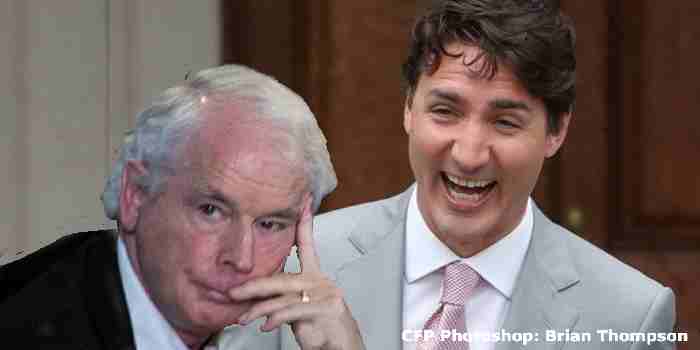By Colin Alexander ——Bio and Archives--March 2, 2023
Canadian News, Politics | CFP Comments | Reader Friendly | Subscribe | Email Us

The most alarming aspect of Justice Paul Rouleau’s finding that Prime Minister Justin Trudeau’s invocation of the Emergencies Act was justified is that the Laurentian elite owns the justice system. In effect, Justice Rouleau parroted the stance taken by Chief Justice Richard Wagner, as manifested by his interview with Le Devoir (April 9, 2022). The Chief Justice said, “Forced blows against the state, justice and democratic institutions like the one delivered by protesters to the doors of the Prime Minister's office and the Privy Council, Parliament, the Supreme Court of Canada and the parliamentary press gallery must be denounced with force, and by all the powers of the state.” (My translation)
Given that there are several active cases in the courts challenging the federal government’s invocation of the Emergencies Act, and also challenging the Covid restrictions, in due course any one of them could come before the Supreme Court. Would the Chief Justice then stand down? Or would he welcome the opportunity to assert the biases we now know he openly promotes? A reasonable and informed outsider could conclude that the Chief Justice endorses weaponizing the justice system for political ends.
The case may be stated that the only justification for judicial independence is to safeguard the rights of citizens, meaning the individual against government overreach. Absent credibly independent oversight or accountability, however, judicial independence now represents the personal right of judges simply to say and do whatever they want and, notably, as stooges of the government.
You need to know that the Canadian Judicial Council’s (CJC’s) Ethical Principles for Judges says this:
Like partisan political activity, out of court statements by a judge concerning issues of public controversy may undermine impartiality. They are also likely to lead to public confusion about the nature of the relationship between the judiciary on the one hand and the executive and legislative branches of government on the other. Partisan actions and political statements by definition involve a judge in publicly choosing one side of a debate over another.
How could any reasonable and informed outsider fail to see that the Chief Justice adopted a partisan stance in favour of the government and against the protesters? The issue is not whether his position was right or wrong, let alone that of the protesters. He had no business in saying what he said. That’s what the CJC’s code of conduct says.
Contradicting the assertion that the protest was the beginning of what the Chief Justice called “anarchy and an exercise in hostage-taking,” Ontario’s Superior Court Justice Andrew Goodman said, when releasing her on bail, “Ms. (Tamara) Lich is not charged with sedition or inciting a riot.” And nothing happened remotely resembling what the Chief Justice called “forced blows against the state, justice and democratic institutions …” How, then, can any free and democratic society have a Chief Justice spluttering such figments of his lurid imagination? Or was he simply besotted with deference to the overblown inventions of the Prime Minister and members of his cabinet?
Responding to a complaint to the CJC about what the Chief Justice said, acting executive director Jacqueline Corado wrote this: “Considering that your complaint is unsupported, is largely based on a hypothetical scenario, is manifestly without substance, and does not concern judicial conduct, it does not warrant further consideration by the Council.” Did the Chief Justice himself write that?
In a similar case in 1982, the CJC conducted an inquiry into comments made by then Justice Thomas Berger of the BC Supreme Court. With comments appearing in an article he wrote for the Ottawa Citizen and elsewhere, the judge was concerned about the entrenchment of native rights and language rights in the constitution. He said the apparent decision of the first ministers to “abandon” native rights to be “mean-spirited and unbelievable.” In his own defence, Justice Berger wrote, “The issues which I discussed transcended partisan politics.” This is what the CJC said about Justice Berger’s conduct:
Support Canada Free Press

Following publication of these observations, Justice Berger resigned from the bench. Over the years, I’ve had differences over Indigenous issues with Mr. Berger. But he deserves full credit for his resignation. So how should Canadians regard the intervention of Chief Justice Wagner—and now Justice Rouleau’s conclusion—on the obviously partisan issues relating to the Truckers’ Freedom Convoy?
While it may seem like an exaggerated comparison in today’s docile Canada, the great movie Judgment at Nuremberg, based on fact, shows what can happen. In Germany Hitler’s justice system condemned to death dissidents and “fringe minorities.” On the evidence, Justice Rouleau confirmed that Canada’s justice system stands for government by the elite, for the elite and against the people.
View Comments
Colin Alexander was publisher of the Yellowknife News of the North. His forthcoming book, to be published soon by Frontier Centre for Public Policy, is Justice on Trial: Truckers Freedom Convoy and other problematic cases.